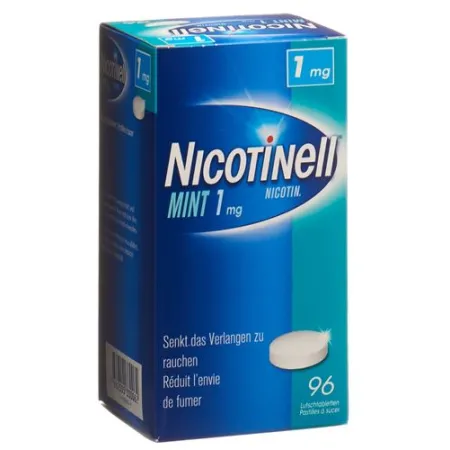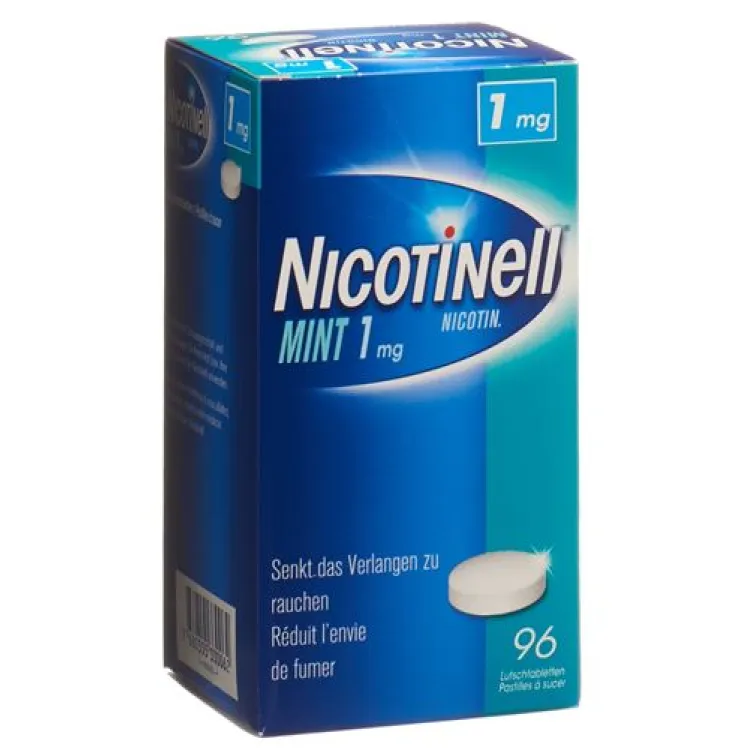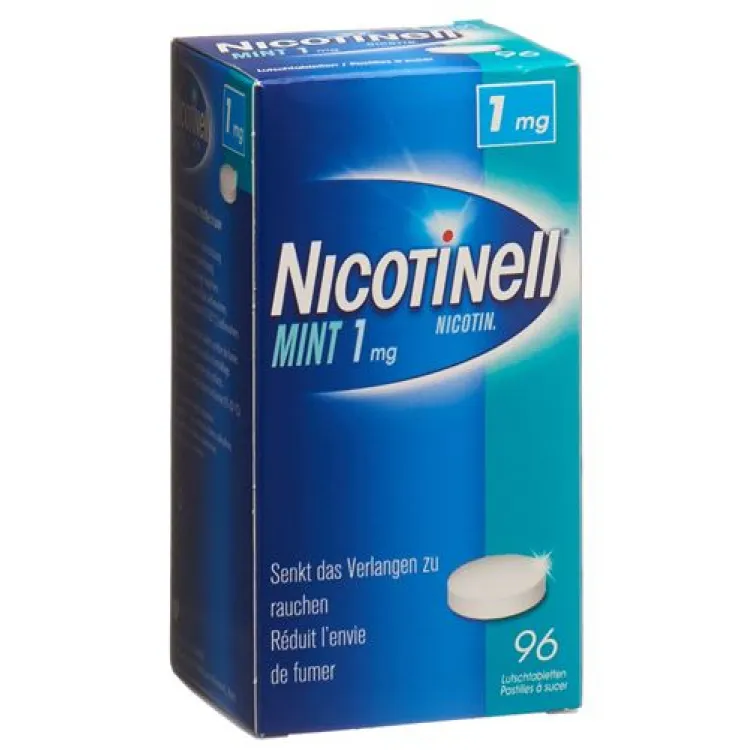Nicotinell lozenges 1 mg mint 96 pcs
Nicotinell Lutschtabl 1 mg mint 96 Stk
-
129.43 USD

- Availability: Outstock
- Distributor: GSK CONS. HEALTHC. AG
- Brand: Nicotinell
- Product Code: 3321443
- ATC-code N07BA01
- EAN 7680555330062
Ingredient:
Description
Nicotinell lozenges are lozenges containing nicotine. They are recommended as support when trying to quit smoking or to reduce cigarette consumption as a first step.
When using the lozenges, nicotine is released for about 30 minutes. Nicotine is the addictive component in tobacco smoke and is responsible for the various withdrawal symptoms associated with smoking cessation. Administering nicotine with Nicotinell reduces these withdrawal symptoms and makes it easier for smokers to give up cigarette nicotine.
Experience has shown that after a while, as you develop new habits (substitutes for smoking), you will find it easier to gradually get by with fewer Nicotinell lozenges and later to stop completely.
Health damage caused by the tar and carbon monoxide content in tobacco smoke is avoided.
Swissmedic-approved patient information
Nicotinell Mint 1 mg/2 mg, lozenge
What are Nicotinell lozenges and when are they used?
Nicotinell lozenges are lozenges containing nicotine. They are recommended as support when trying to quit smoking or to reduce cigarette consumption as a first step.
When using the lozenges, nicotine is released for about 30 minutes. Nicotine is the addictive component in tobacco smoke and is responsible for the various withdrawal symptoms associated with smoking cessation. Administering nicotine with Nicotinell reduces these withdrawal symptoms and makes it easier for smokers to give up cigarette nicotine.
Experience has shown that after a while, as you develop new habits (substitutes for smoking), you will find it easier to gradually get by with fewer Nicotinell lozenges and later to stop completely.
Health damage caused by the tar and carbon monoxide content in tobacco smoke is avoided.
What should be considered?
Your motivation and willpower are decisive for the success of the treatment.
If you use Nicotinell lozenges as part of a weaning cure, you should stop smoking completely, as continuing to smoke without reducing the risk of side effects, including for the heart and circulatory system, due to a higher nicotine level than with habitual smoking is given.
It is therefore important that you have a strong motivation to quit smoking before starting Nicotinell treatment. Professional smoking advice increases the chances of quitting successfully.
Nicotinell lozenges are not stimulants. It may take a few days to get used to the taste of Nicotinell lozenges.
Nicotinell lozenges are sweetened with aspartame and maltitol. Therefore, Nicotinell lozenges can also be used by diabetics, taking into account the precautionary measures (see "When is caution required when using Nicotinell lozenges?").
If you use Nicotinell lozenges to reduce cigarette consumption, please note that you only use the lozenges when you are not smoking. With long-term use there is a risk of damage to the oral mucosa.
When should Nicotinell lozenges not be used?
Nicotinell lozenges should not be used in the following cases:
- If you are known to be hypersensitive to nicotine or one of the excipients according to the composition.
- During pregnancy and breastfeeding (see «Can Nicotinell lozenges be used during pregnancy or while breastfeeding?».
- Nicotinell lozenges may not be used by children under the age of 12. For young people under the age of 18 and over 12, the drug should only be used if there is a strong nicotine dependency and only after consulting a doctor.
When is caution needed when using Nicotinell lozenges?
If you have any health problems, suffer from chronic throat conditions or any of the following conditions, then before you start of the treatment program with Nicotinell, carefully discuss the benefits and risks with your doctor:
- Diabetes mellitus: when you start nicotine replacement therapy, you should check your blood sugar levels more frequently than usual, as blood sugar levels can fluctuate more widely. The drug therapy may need to be adjusted;
- Cardiovascular diseases such as stable angina pectoris, recent heart attack, cardiac arrhythmias, heart failure (heart failure), high blood pressure, circulatory disorders in the arms and legs (e.g. smoker's leg), diseases of the blood vessels, stroke;
- Kidney and liver diseases;
- Hyperthyroidism, pheochromocytoma (adrenaline-producing tumor of the adrenal gland);
- Inflammation of the lining of the stomach or stomach and intestines, inflamed esophagus. Nicotine replacement therapy may worsen symptoms;
- Epilepsy if you have a history of seizures.
addicted smokers immediately (less than 4 weeks) after a heart attack, with severe abnormal heart rhythms or recent stroke, Nicotinell lozenges should only be used under medical supervision. In these cases, the use of the preparation should only be considered if smoking cessation is not possible without the support of medication. If new cardiovascular symptoms develop or existing symptoms worsen (chest pain, irregular heart rate, shortness of breath), a doctor should be consulted.
This medicine may affect your ability to react, your ability to drive and your ability to use any tools or machines.
Information on the excipients
Aspartame (E 951):
This medicinal product contains 10 mg aspartame per lozenge. Aspartame is a source of phenylalanine. It can be harmful if you have phenylketonuria (PKU), a rare inherited disorder in which phenylalanine builds up because the body can't break it down enough.
Maltitol (E 965):
This medicine contains maltitol. Please only take Nicotinell lozenges after consulting your doctor if you know that you suffer from a sugar intolerance. May have a mild laxative effect.
Tell your doctor, pharmacist or druggist if you
- suffer from other diseases,
- have allergies or
- use other medicines (including those you bought yourself!).
Important interactions with other medicines
Smoking cessation, with or without nicotine substitutes such as Nicotinell lozenges, can reduce the response to concomitant medicines such as asthma, cardiac arrhythmia, severe pain, mood disorders, Alzheimer's disease, Parkinson's disease, restless leg syndrome or diabetes (insulin). If necessary, your doctor will prescribe a dose adjustment of the medicines concerned.
Can Nicotinell lozenges be used while pregnant or breastfeeding?
Pregnancy
If you are pregnant, you should try to quit smoking without using medicines.
Nicotine in any form can harm the unborn child.
No form of nicotine should be used during pregnancy, including Nicotinell lozenges. Nicotine, and especially smoking, can seriously harm the health of the fetus and infant and should be discontinued during pregnancy.
Talk to your doctor about how to quit smoking during this time.
Breastfeeding
Nicotine passes into breast milk.
Nicotinell lozenges should not be used during breast-feeding, nor should any other form of nicotine be used, or breast-feeding should be avoided and the infant switched to bottle-feeding.
How do you use Nicotinell lozenges?
Nicotinell lozenges are intended for adults aged 18 and over.
For adolescents under 18 years and over 12 years of age, the preparation should only be used if there is a strong nicotine dependency and only after consulting a doctor (see also «When should Nicotinell lozenges not be used?»).
If you are heavily addicted to nicotine, i. first cigarette within 20 minutes of getting up and smoke more than 20 cigarettes a day, start treatment with Nicotinell 2 mg lozenge. In the case of weak to moderate nicotine dependence, Nicotinell 1 mg lozenges are usually sufficient.
No more than 15 Nicotinell lozenges should be sucked per day. Do not use more than 1 lozenge per hour.
Method of administration
If you feel like smoking, slowly suck a Nicotinell lozenge for about 30 minutes. Periodically move the lozenge from side to side of the mouth until it is completely dissolved. Take regular breaks and let the released nicotine act on the oral mucosa.
Do not chew or swallow the lozenge whole.
Do not eat or drink while the lozenge is in your mouth. You should not have any drinks immediately before and during sucking, as this greatly reduces the effect of the nicotine released.
Quitting
For most smokers, 8 to 12 lozenges of the appropriate strength per day are usually sufficient. No more than 15 Nicotinell lozenges should be sucked per day. Do not use more than 1 lozenge per hour.
After 8 weeks, it's time to start gradually cutting back on nicotine. For the next 2 weeks, reduce the number of lozenges per day by half. Stop treatment after the next 2 weeks if you managed to get the dose down to zero on the last day. The duration of treatment is individual, but is a maximum of 3 months.
Reduction of cigarette consumption
The lozenges are used during the smoke-free intervals in order to prolong them as long as possible and thus reduce cigarette consumption as much as possible. Never use the lozenges and smoke at the same time or use lozenges and smoke in direct succession without a break. If you have not achieved a significant reduction in your daily cigarette consumption after 6 weeks, you should seek advice from your doctor.
You should try to quit smoking as soon as you feel ready, but no later than 6 months after starting treatment. If you still cannot stop smoking 9 months after starting treatment, you should see your doctor.
The recommended duration of treatment with Nicotinell lozenges is a maximum of 12 months.
Unused lozenges should be kept as the urge to smoke may suddenly return.
Stick to the dosage given in the package leaflet or as prescribed by your doctor. If you think the medicine is too weak or too strong, talk to your doctor, pharmacist or druggist.
What side effects can Nicotinell lozenges have?
The following side effects can occur when using Nicotinell lozenges:
Most side effects occur during the first few weeks after starting Nicotinell treatment. In many cases, incorrect sucking technique is the reason.
At the beginning of Nicotinell treatment, the oral mucosa may become somewhat irritated, or hiccups and nausea may occur from sucking too quickly. In these cases, take a break immediately and allow the lozenge to sit in a cheek pouch for 1 to 2 minutes. The delivery of nicotine is thus interrupted and the irritation quickly subsides. Then you suck again very slowly with further breaks.
Very common (affects more than 1 in 10 people): Headache, gastrointestinal complaints, hiccups, nausea, inflammation of the mouth and throat, pain in the chewing muscles.
Common (affects 1 to 10 users in 100): dizziness, sore throat, pain in the throat, cough, vomiting, indigestion, abdominal pain, diarrhea, dry mouth, constipation, gas, inflammation of the mouth ( stomatitis).
Uncommon (affects 1 to 10 in 1,000 people treated): palpitations, palpitations and reddening of the skin, nettle fever and abnormal sensations in the skin area.
Rare (affects 1 to 10 users in 10,000): allergic reactions, swelling of the face/throat, tremor, shortness of breath, difficulty swallowing, belching, increased salivation, blistering of the oral mucosa, weakness, Fatigue, malaise, flu-like symptoms.
Very rare (affects less than 1 in 10,000 people): Heart rhythm disorders.
Certain side effects such as canker sores, dizziness, headaches and insomnia can also be caused by the withdrawal symptoms that occur as part of smoking cessation.
Persistent nicotine addiction can occur.
Overdose
An overdose can occur if several lozenges are mistakenly sucked at the same time or in rapid succession, or if people smoke at the same time. In the event of an overdose, the symptoms correspond to those of acute nicotine poisoning.
The following occur: nausea, salivation, abdominal pain, vomiting, diarrhoea, hearing and vision disorders, headaches, tremors, tachycardia, sweating, low temperature, dizziness, confusion, paleness and pronounced weakness. In extreme cases, the following can follow: cramps, drop in blood pressure, weak, irregular pulse, respiratory failure and fainting, circulatory collapse.
In the event of an overdose or suspected overdose, the nicotine supply must be stopped immediately. Consult a doctor immediately. Even small amounts of nicotine are dangerous for children and can lead to severe symptoms of poisoning, which can be fatal. If you suspect nicotine poisoning in children, you must seek emergency medical help.
If you get any side effects, talk to your doctor, pharmacist or druggist. This also applies in particular to side effects that are not listed in this leaflet.
What else needs to be considered?
Special warning for children
Keep medicines out of the reach of children. Nicotine is a highly toxic substance. Even the dose tolerated by adults during treatment can lead to life-threatening symptoms of poisoning in children, possibly with a fatal outcome.
Therefore, Nicotinell lozenges must be kept and disposed of out of the reach of children at all times.
Shelf life
The medicinal product may only be used up to the date marked «EXP» on the container.
Storage instructions
Store at room temperature (15-25°C).
Keep out of the reach of children.
Further information
Your doctor, pharmacist or druggist can provide you with further information. These people have the detailed information for specialists.
What does Nicotinell lozenge contain?
Active substance
1 lozenge Nicotinell Mint 1 mg contains: 1 mg nicotine (as ditartrate dihydrate)
1 Nicotinell Mint 2 mg lozenge contains: 2 mg nicotine (as ditartrate dihydrate)
Excipients
Maltitol (E 965) (equivalent to 2 kcal per lozenge), aspartame (E 951), polyacrylate dispersion 30%, xanthan gum, anhydrous sodium carbonate, sodium bicarbonate , Magnesium Stearate, Colloidal Anhydrous Silica, Peppermint Oil, Levomenthol.
Approval number
55533 (Swissmedic).
Where can you get Nicotinell lozenges? What packs are available?
In pharmacies and drugstores, without a doctor's prescription.
Nicotinell Mint 1 mg lozenges: Packs of 36, 96 and 204 lozenges.
Nicotinell Mint 2 mg lozenges: Packs of 36, 96 and 204 lozenges.
Authorization holder
GSK Consumer Healthcare Schweiz AG, Risch.
This leaflet was last checked by the Medicines Agency (Swissmedic) in June 2021.





